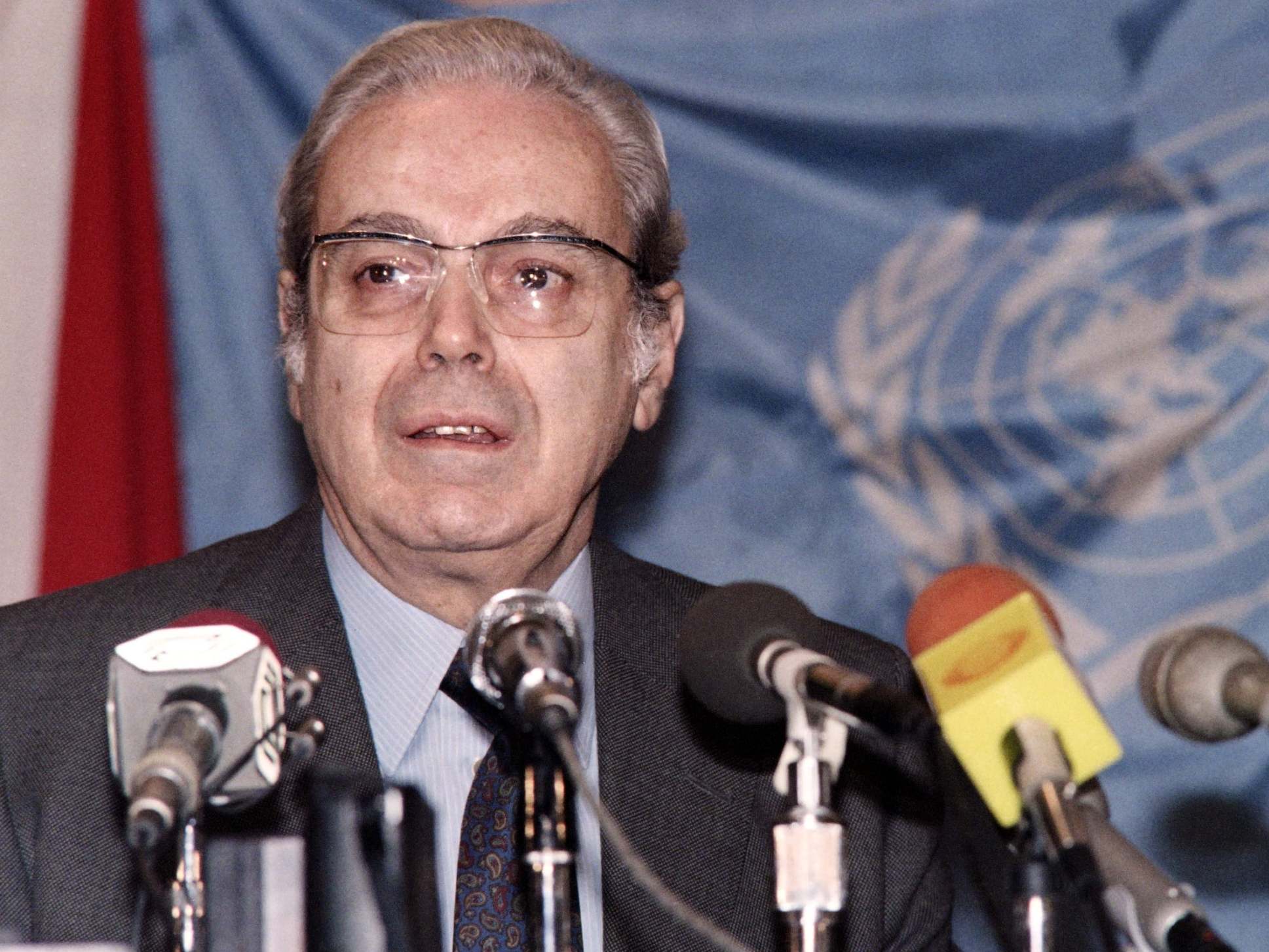Javier Perez de Cuellar: Peruvian diplomat who led the UN through a remarkable period of peacemaking
He seized on the Cold War thaw to oversee a series of successful deals to end conflicts around the world

Javier Perez de Cuellar was a soft-spoken Peruvian diplomat who led the United Nations (UN) as its fifth secretary general through bitter confrontation with the US Congress during the Reagan administration to a period of unprecedented peacemaking that coincided with the end of the Cold War.
Perez de Cuellar, who has died aged 100, served as UN secretary general from 1982 to 1991 and was a practitioner of quiet diplomacy. He gained a reputation in his first term as a competent yet bland bureaucrat who appeared powerless to stem the tide of conflicts in Afghanistan, the Middle East and the Falkland Islands. He caught his stride after his 1986 re-election, overseeing a succession of peace deals in Central America, Africa and the Persian Gulf.
The UN peacekeepers won the Nobel Peace Prize under Perez de Cuellar’s tenure in 1988. But his most enduring legacy remains his quiet efforts to coax the UN Security Council’s five permanent members – including Cold War superpowers the United States and the Soviet Union – to work quietly together to forge a peace deal ending the Iran-Iraq war, a conflict that cost more than one million lives.
The Cold War’s demise led to an era of intense UN activism, and Perez de Cuellar seized on the thaw to pursue peace agreements in places like El Salvador, and to help shape postwar settlements in Namibia and Cambodia. Ironically, the “new world order” Perez de Cuellar assiduously promoted culminated with a UN-sanctioned, US-led military conflict against Iraq during the Persian Gulf War. It was a conflict he sought unsuccessfully to avert.
Javier Perez de Cuellar de la Guerra was born in Lima in 1920. He was four when his father, a wealthy businessman, died, and he continued his education in Catholic schools. He graduated with a law degree from Catholic University in Lima and took his first job as a clerk in the Peruvian foreign service to pay his law school tuition.
He once said he decided on a diplomatic career because “it helps you to know countries, and at someone else’s expense”. He spent the next several decades in postings as Peru’s ambassador to Switzerland, the Soviet Union, Venezuela, France and the UN.
Perez de Cuellar joined the UN in 1975 as then-secretary general Kurt Waldheim’s special representative for Cyprus, where the Peruvian diplomat launched negotiations between the island’s Greek president Makarios III and Turkish Cypriot leader Rauf Denktash.
In 1979 Waldheim promoted Perez de Cuellar to undersecretary general for special political affairs, where he fruitlessly pressed the Soviets to withdraw their forces from Afghanistan. He was selected secretary general in December 1981 as a compromise candidate after Waldheim, running for a third term, deadlocked with the Tanzanian foreign minister, Salim Ahmed Salim. Perez de Cuellar received fewer votes than some other candidates, but he prevailed because he was the only one who didn’t get vetoed.
His first term was marked by painful diplomatic setbacks, including the unsuccessful efforts to oversee the withdrawal of Soviet troops from Afghanistan, end the civil war in Lebanon or to negotiate a peace deal between Britain and Argentina during the 1982 Falklands War.
His second term coincided with the arrival of Soviet leader Mikhail Gorbachev and a series of political and economic reforms known as “perestroika”, which created unexpected opportunities for political cooperation between the two superpowers, and for the UN.
Perez de Cuellar oversaw a string of diplomatic successes, including peace deals ending the Iran-Iraq war and conflicts in El Salvador, Namibia and Mozambique. But he was not without his detractors, who maintained that his studiously cultivated image for self-effacement, independence and impartiality masked a more ambitious streak and a willingness to yield to the interests of powerful states to achieve those ambitions.
After his UN retirement, Perez de Cuellar remained active in diplomacy and politics, mounting a failed 1995 campaign against Alberto Fujimori to be president of Peru. He served as the country’s prime minister (2000-01) and its ambassador to France.
He was married twice and is survived by two children.
Javier Perez de Cuellar, diplomat and politician, born 19 January 1920, died 4 March 2020
© Washington Post
Subscribe to Independent Premium to bookmark this article
Want to bookmark your favourite articles and stories to read or reference later? Start your Independent Premium subscription today.

Join our commenting forum
Join thought-provoking conversations, follow other Independent readers and see their replies